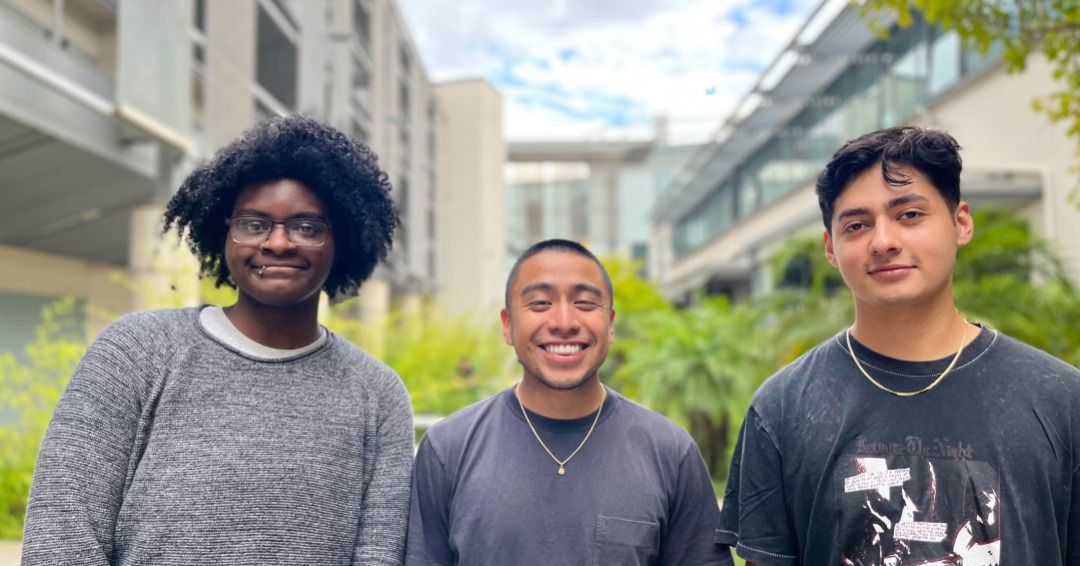Three SMC Students Make Significant Strides Toward Medical Careers
By Dolores Quintana
Three Santa Monica College (SMC) pre-med students were among the 18 students selected earlier this year to participate in the academically intensive Stanford Summer Community College Premedical Program (SSCCPP) at Stanford Medicine. Candido Lopez, a neuroscience major; Jai Williams, a psychology major; and Alexis Molina, an anthropology major, spent six weeks in Palo Alto as part of the 25th annual cohort of this program, which exclusively targets community college students considering careers as physicians and other health professionals.
During their time at Stanford, the three SMC students took part in traditional classes, medical school admissions workshops, and science-based classes such as human anatomy and molecular cellular biology. They also shadowed physicians and other health professionals and engaged in scholarly research on health disparities, presenting their research projects with their peers.
Lopez and Molina will transfer to UCLA this fall, while Jai Williams plans to move next year, with UCLA, UC Berkeley, or UC San Diego as potential options.
The program, which concluded in early August, was launched in 2015 by Stanford Medicine’s Office of Diversity in Medical Education (ODME). It seeks out current community college students considered low-income and underrepresented in medicine and provides exposure to medicine and health through various topics and experiences.
Candido Lopez and Alexis Molina both chose to attend SMC for similar reasons—they hadn’t performed exceptionally well in high school, and SMC provided them with a second chance. They credited the college’s supportive culture and programs like EOPS, the Latino Center/Adelante Program, and the Men of Color Action Network for helping them succeed.
Jai Williams is also part of SMC’s Scholars Program, preparing students to transfer to top four-year colleges and universities. When the Scholars Program shared the opportunity at Stanford, Williams decided to apply, and to his surprise, he was accepted.
Their experience at Stanford was significant, according to Candido Lopez, who found validation in his connections with medical students and residents from similar backgrounds. He hopes to pursue a career in either neurology or orthopedics. Alexis Molina, a cancer survivor, is undecided between emergency medicine and surgical oncology. As for Jai Williams, he originally wanted to be a surgeon but fell in love with psychology, plans to enter the field, and aims to address mental health challenges.
Lopez and Molina share a common purpose: to provide stability for their families and help address the inequities faced by low-income individuals and people of color in the healthcare system. Their experiences with healthcare disparities have motivated them to pursue careers that make a difference in healthcare access and quality.
The SSCCPP program will admit up to 20 participants for the 2024 summer program and offer application workshops and information sessions during the application cycle. College administrators, counselors, and educators can request information sessions or presentations by emailing odme_outreach@stanford.edu. For more information on Stanford Medicine’s Office of Diversity in Medical Education and its mission, visit med.stanford.edu/odme.
The Stanford Summer Community College Premedical Program (SSCCPP) targets current community college students considered low-income and underrepresented in medicine, providing exposure to medicine and health through various topics. This includes health disparities, leadership challenges in health provision and administration, science success strategies, professional development, clinical exposure, successful preparation for the medical school application process, and postsecondary and graduate/professional school financing. The program began as a two-week virtual program and transitioned to an in-residence experience for selectees. Participants received housing, a meal plan, and a small stipend to support their pre-professional development. They were engaged in scholarly, social, research, and clinical sessions six days per week.












